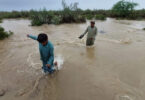Monitoring Desk
The Maine Lobster festival is not for the faint of heart. Tens of thousands of people travel to Rockland, Maine – a town of about 7,000 full-time residents along the southern coast of the state – to attend the salty affair every year. The event, immortalized by David Foster Wallace in Consider the Lobster, features carnival rides, cooking competitions, a Sea Goddess beauty pageant and, of course, a lot of lobster.
No Sea Goddess will be crowned this year. With the Covid-19 crisis rapidly spreading throughout tNew England, the festival has been cancelled. While the lobsters have been spared for another year, the communities that rally around the seasonal event are bracing for a hard hit.
Many parts of Maine, which dubs itself “Vacationland”, rely on the millions of tourists that flock to its beach towns and sandy shores during the summer. The state had over 37 million out-of-state visitors in 2019, who spent a total of $6.5bn. There is some skiing in winter but three-quarters of visitors who spent at least a day and a night in the state visited during May and September.
This summer will look a lot different and not just because the Lobster festival has been cancelled.
While Maine has seen a little over 1,000 positive Covid-19 cases and 52 deaths out of its population of over 1m – a relatively small number compared to other states in the US northeast region – the state is taking precautionary measures to keep its numbers low.
On Thursday, the Maine governor Janet Mills announced an extension of the state-wide stay-at-home orders until 31 May. For the rest of the month, any visitors to the state will be asked to quarantine for 14 days, Mills said. Many of the state’s tourist-oriented businesses such as hotels and campgrounds will be allowed to open 1 July, according to the state’s most recent plan to reopen the economy.
“As other states experience devastating outbreaks, we cannot let our guards down,” Mills said at a press conference.
A shorter summer tourist season – or, if stay-at-home orders continue through the summer, no season at all – will mean devastating effects for much of the state’s economy that relies on summer’s visitors to keep communities afloat.
Maria Irrera who has a holiday rental close to her home in the idyllic seaside village of Lincolnville Beach, a short drive from Rockland, has already had to cancel three summer bookings.
Lincolnville Beach has one of the few sandy beaches along midcoast Maine. During the summer, holidaymakers can dine out at McLaughlin’s Lobster Shack or down oysters and cocktails at the Wheel House Beach Bar, housed in the converted wheelhouse of an old sardine carrier boat.
“If I look out the window at the beautiful bay, and if I hadn’t read the news, I wouldn’t know there was anything wrong,” said Irrera.
Airbnb had asked renters to cancel bookings until May and while Maine has been less affected by coronavirus and is now beginning the process of opening back up, Irrera is worried about making future reservations and the impact of the shutdown on her community.
“I’m OK. I can work from home. But the hotels? They don’t know what’s going on,” she said. “Everyone’s losing so much money.”
The travel industry in the US as a whole is feeling the severe effects of stay-at-home orders. The US Travel Association estimates that the industry has lost $99bn since shutdowns started at the beginning of March.
Even if states begin to relax their stay-at-home orders, it is unclear what travel will look like before a vaccine is created, which could take up to 18 months to roll out. While there are many people who are eager to leave the homes they have been quarantining for a nice vacation on the beach, there are also many who are worried about what traveling could mean for contracting or further spreading the virus.
The US travel industry is closely watching China, where reports of infection have dropped dramatically over the last weeks, but demand for flights is at about 45% of what it was before the crisis, according to the International Air Transport Association (Iata). Most of the flights can be attributed to people going back to work and to visit friends and family; the tourism market in the country has not seen as much of a resurgence.
The situation looks even more stark for the US, where there has been no increase in demand for air travel – despite the number of infections decreasing – because of health concerns and an overall downturn in the economy.
“The (aviation) industry is in freefall and we have not hit rock bottom,” said Alexandre de Juniac, Iata’s CEO, in a statement.
While the airline industry’s numbers may be a canary in the coal mine for how the rest of the travel industry is doing, Maine and the rest of New England are holding on to hope that the economy will reopen by the peak of the season, in late June.
In Massachusetts, communities on the southwestern coast have already seen cancellations or the postponing of major summer events such as county fairs, food and wine festivals and annual concerts.
In Nantucket, the former whaling island that is the summer home of some of the US’s wealthiest people, local shops, museums and restaurants are all closed down right as they are supposed to be kicking into gear. The annual Daffodil festival, an event that usually provides an early kick-off to the start of the season, was cancelled as stay-at-home orders continue until 18 May.
“If this lingers on into the summer, that will severely impact tourism. In Nantucket, it’s basically the primary income source,” said William DeSousa-Mauk, spokesperson for the Nantucket Chamber of Commerce. “Our economy would collapse.”
Mark Snyder, owner of The Nantucket Hotel and the Winnetu Oceanside Resort on Martha’s Vineyard, said he has not had to layoff any of his employees, even though his hotel on Nantucket is open only for essential travel and resort on Martha’s Vineyard is closed completely.
“We need to be open late and June and on, otherwise we will have problems,” Snyder said. “If we couldn’t open this summer, that would be painful.”
But money isn’t everything.
Compared to Maine, Massachusetts is a coronavirus hotspot: the state of nearly 7 million people has had more than 62,200 cases of coronavirus and 3,500 deaths, many concentrated in Boston.
Nantucket and its neighbor island, the even more posh Martha’s Vineyard, have been successful in keeping the virus off their shores, having about 30 positive cases altogether out of its populations of 11,000 and 16,000, respectively. Both islands, and Maine, are popular with New Yorkers, the state that has the most coronavirus cases in the country.
Reopening would have to be a balancing act that prioritizes keeping local residents healthy while making sure tourists can come in to fuel the local economy. “There’s really no other industry,” DeSousa-Mauk said.
Courtesy: (TheGuardian)






